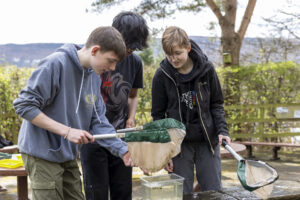It has been a while since we had an update on the progress of the GCSE in Natural History, so this is where we are.
The Department for Education announced the new GCSE as part of their Climate Change and Sustainability programme, in April 2022. This initiative sets out a range of measures for schools and young people to help foster greater awareness about the environmental crises we face.
It was quite a launch with speeches made to a large audience beneath the skeleton of a Blue Whale in the main hall of the Natural History Museum in London. Immediately, the Department appointed a panel to establish what is called the ‘subject criteria’ for the qualification, with subject criteria defined as:
GCSE subject criteria set out the knowledge, understanding, skills and assessment objectives common to all GCSE specifications in a given subject. They provide the framework within which awarding organisations create the detail of their specifications, so ensuring progression from key stage 3 national curriculum requirements and the possibilities for progression to A level.
Think of subject criteria as the overarching principles for the GCSE, and they are vital. If the master framework is not right the syllabuses that will be set by the various exam boards will not be right either, as all the exam boards are different.

The criteria have now been written by the secret panel (the whole process is secret) and are now submitted and sitting with Nick Gibb, the Schools Minister. Mr Gibb has had them for many months but they have not yet been signed off, there are obviously queries to be answered and there is no time scale given when this will happen. What is certain is that this delay will mean first teaching will now be in 2026, not 2025, as there is so much to do to get schools ready.
It is a complicated business launching a new GCSE, and we know from surveys and communication with schools that there is some concern that teachers feel underconfident about teaching it. Many feel they don’t have the skills, they are worried about resources and are unsure about access to experts and even to wildlife itself.
Some of that is answered in the Department of Education’s proposal to create Nature Parks, using school grounds as nature reserves for study. This is an excellent initiative, but wildlife areas need skilled people to keep them going.
Curlew Action sees the need for local, bespoke teacher and pupil training through what we are calling Nature Hubs. A Nature Hub is a place to go to learn about being a naturalist. It will offer training in identification skills, fieldwork, field safety, local ecology, and local natural history. Nature Hubs will, ideally, be all over the country, connecting need with expertise. It is a big and bold idea, and we it needs blended finance to work, but we are working hard to secure it. We are putting time and effort into this as we know nature needs us to act fast.
So – watch this space for updates and more information as the GCSE in Natural History grinds through the system and as we make Nature Hubs a reality, getting schools, teachers, and pupils ready for a much more nature aware future. All this, of course, fitting in with the Department for Education’s own plans, which will start to unfold in the near future. Exciting times ahead.
More on natural history and education:
- Embedding Natural History into our own, and our children’s, education
- Creating future naturalists: why is Natural History education so important?

